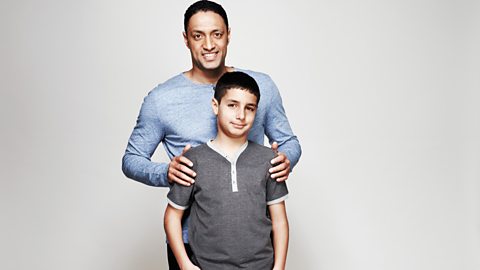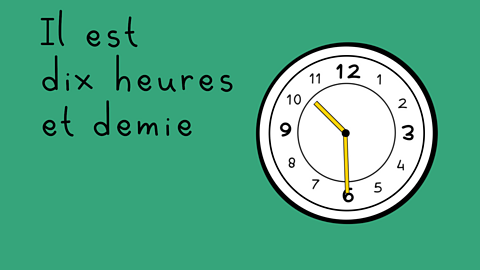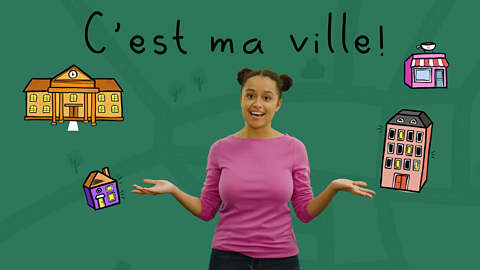Describing people in French
When youâre describing how you or other people look or are - then ÊģŲ°ųąð - the âverb to be is a good place to start.â
Je suis - I am or elle est - she is.â
Je suis grand - I am ģŲēđąôąô.â
Elle est petite - She is small.â
Je suis sportif - I am sporty. â
âElle est contente - She is happy.â
Then itâs good to be able to say what people have using the verb avoir - to âhave.
Âáâaūą - I have
elle a - she has.
Jâai les cheveux longs - I have long hairâ.
Elle a les yeux bruns - She has brown eyes. â
Then you can say what you wear using porter - to wearâ.
âje porte - I wear.
elle porte - she wears.
Je porte des lunettes - I wear glasses.
Elle porte un foulard - She wears a headscarf.â
So with ÊģŲ°ųąð - to be, avoir - to have or porter - to wear you can say a lot about âyourself or other people.â
Describing peopleâs height
To describe peopleâs size, use a form of ÊģŲ°ųąð (to be) and then the adjective, which usually âchanges its ending depending on whether the person is masculine or feminine.â
- Mon pÃĻre est grand - My dad is ģŲēđąôąô.â
- Ma mÃĻre est grande - My mum is ģŲēđąôąô.â
- Ma sÅur est de taille moyenne - My sister is medium height.â
- Mon demi-frÃĻre est petit - My step-brother is ēõģóīĮ°ųģŲ.â
- Ma grand-mÃĻre est petite - My grandmother is ēõģóīĮ°ųģŲ.â

Image caption, Mon pÃĻre est grand
1 of 5
You can use intensifiers (words that add âforceâ to an adjective) such as âģŲ°ųÃĻēõ (very) and assez (quite) to add more information.â
- Je suis ģŲ°ųÃĻēõ grand(e) - I am very ģŲēđąôąô.â
- Mon grand-pÃĻre est assez petit - My grandfather is quite ēõģóīĮ°ųģŲ.â
Comparing peopleâs heights
To compare two people, use the following sentence structure:â
| Person one + a form of ÊģŲ°ųąð (to be)â | more / less + adjective | ģŲģóēđēÔ/ēđēõâ | person twoâ |
|---|---|---|---|
| Je suis (I am) | plus grand(e)â â(ģŲēđąôąôąð°ų)â | que â(ģŲģóēđēÔ)â | mon frÃĻre (my brother)â |
| Ma sÅur est (My sister is) | moins grande ââ(less tall / not as tall)â | que â(ģŲģóēđēÔ/ēđēõââ)â | ma mÃĻre (my mum)â |
Describing hair
To talk about your hair, use a form of avoir (to have), followed by les cheveux (hair) and âthen give the colour or another adjective to describe your hair.
- Jâai les cheveux bruns - I have brown hair.â
- Il a les cheveux bruns et īÚ°ųūąēõÃĐēõ - He has brown, curly hair. â
If you want to use more than one adjective to describe your hair, use et before the last âadjective:â
- Jâai les cheveux blonds, longs et ēúīĮģÜģĶąôÃĐēõ - I have long, blond, wavy hair.â
The adjectives all need to have an âsâ on the end, as les cheveux is masculine and plural, âexcept roux and gris, as they donât change when masculine and plural.â
| French | ·ĄēÔēĩąôūąēõģóâ |
|---|---|
| j'ai les cheveux âĶ | âI have âĶ hair |
| il / elle a les cheveux âĶâ | he / she has âĶ hair |
| bruns | brown |
| noirs | black |
| roux | red / ginger |
| blonds | blond |
| gris | grey |
| longs | long |
| courts | short |
| raides | straight |
| ēúīĮģÜģĶąôÃĐēõ | wavy |
| īÚ°ųūąēõÃĐēõ | curly |
Describing eye colour
To talk about eye colour, use Âáâaūą (I have) or il a/elle a (he has/she has), followed by les âyeux (eyes) and then give the colour.â
The adjectives all need to have an âsâ on the end, as les yeux is masculine and plural, âexcept marron, noisette and gris, as they donât change when used in the masculine and âplural.â
- Jâai les yeux verts - I have green eyes.â
- Jâai les yeux marron - I have brown eyes.â
| French | English |
|---|---|
| Âáâaūą les yeux âĶâ | I have âĶ eyes |
| il / elle a les yeux âĶâ | he / she has âĶ eyes |
| bleus | blue |
| marron | brown |
| verts | green |
| gris | grey |
| noisette | hazel |
Describing other features
There are lots of other things you can say about someoneâs appearance. Here are a few âmore examples:â
| French | English |
|---|---|
| Âáâaūą des taches de rousseur | I have freckles |
| je porte des lunettes | I wear glasses |
| je porte le hijab / je porte le voile | I wear a hijab / headscarfâ |
| je porte un turban | I wear a turban |
| il a une barbe | he has a beard |
| il a une moustache | he has a moustache |
| il est chauve | he is bald |
Describing personalities
There are lots of adjectives you can use to talk about peopleâs personalities.
Most adjective endings change depending on whether the person you are talking about is âmale or female. âUsually, you add an âeâ to the adjective to describe a female person: â
- Mon copain, qui sâappelle Nabil, est amusant et ģŲ°ųÃĻēõ bavard - My (male) friend, âNabil, is funny and very chatty.â
- Ma copine, qui sâappelle Anya, est amusante et ģŲ°ųÃĻēõ bavarde - My (female) friend, âAnya is funny and very chatty.â
Sometimes, you need to change the last consonant and add an âeâ to make an adjective âfeminine. With some adjectives, you have to double the consonant and add an âeâ.â
- Mon copain, qui sâappelle Nabil, est gentil et ģŲ°ųÃĻēõ sportif - My (male) friend, Nabil, âis kind and very sporty.â
- Ma copine, qui sâappelle Anya, est gentille et ģŲ°ųÃĻēõ sportive - My (female) friend, âAnya is kind and very sporty.â
Some adjectives donât change when they are feminine.â
- Mon copain, qui sâappelle Nabil, est sympa et ģŲ°ųÃĻēõ ŧå°ųÃīąôąð - My (male) friend, Nabil, âis nice and very funny.â
- Ma copine, qui sâappelle Anya, est sympa ģŲ°ųÃĻēõ ŧå°ųÃīąôąð - My (female) friend, Anya is ânice and very funny.â
Here are some great adjectives you can use to describe peopleâs personalities:â
| Masculine | Feminine | English |
|---|---|---|
| amusant | amusante | funny / fun |
| bavard | bavarde | chatty |
| ūąēÔģŲÃĐ°ųąðēõēõēđēÔģŲ | ūąēÔģŲÃĐ°ųąðēõēõēđēÔģŲe | interesting |
| strict | stricte | strict |
| sportif | sportive | sporty |
| ģĶ°ųÃĐēđģŲūąīÚ | ģĶ°ųÃĐēđģŲūąve | creative |
| travailleur | travailleuse | hard-working |
| paresseux | paresseuse | lazy |
| ennuyeux | ennuyeuse | boring |
| gentil | gentille | kind |
| sympa | sympa | nice |
| ŧå°ųÃīąôąð | ŧå°ųÃīąôąð | funny |
Quiz
Watch the video and find out how much you know about describing people in French in this short quiz.â
MICHEL: Aah, merciâĶâ.
īĄēŅÃģĒąõ·Ą: Je suis ģŲ°ųÃĻēõ contente d'ÊģŲ°ųąð dans la nouvelle classe.
MICHEL: **Ah oui, moi aussi je suis content.**â
īĄēŅÃģĒąõ·Ą: **Oui. Il y a de nouveaux ÃĐtudiants cette annÃĐe.**â
MICHEL:â Câest vrai. Tu as rencontrÃĐ Georges?â
īĄēŅÃģĒąõ·Ą: AhhhâĶ Georges?
MICHEL: **Oui. Il est assez grand avec les cheveux bruns. Tu le connais?**â
īĄēŅÃģĒąõ·Ą: Ah oui, Âáâaūą rencontrÃĐ Georges. Il est ģŲ°ųÃĻēõ sympa.
MICHEL: **Câest lui.**â
īĄēŅÃģĒąõ·Ą: Câest le frÃĻre de Françoise. Tu connais Françoise?â
MICHEL: **Oui, Je la connais. Elle aussi est ģŲ°ųÃĻēõ sympa.**â
īĄēŅÃģĒąõ·Ą: Tu sais que Georges and Françoise sont jumeaux?
MICHEL: Non! Ce nâest pas vrai!
īĄēŅÃģĒąõ·Ą: **Oui câest vrai.**â
MICHEL: Elle a les cheveux roux et des taches de rousseur.
īĄēŅÃģĒąõ·Ą: Et Georges a les cheveux bruns et les yeux bleus.
MICHEL: Elle est travailleuse âĶâ
īĄēŅÃģĒąõ·Ą: **Tu as raison.**â
MICHEL: Ils sont si diffÃĐrents. Françoise est silencieuse et âĶ
īĄēŅÃģĒąõ·Ą: **âĶ et Georges est bavard.**â
MICHEL: Jâaime beaucoup Georges.
īĄēŅÃģĒąõ·Ą: **Moi aussi. Je lâaime beaucoup.**â
MICHEL: **Câest GeorgesâĶ AllÃī? Oh bonjour Georges. Tu veux venir chez AmÃĐlie? Je suis ici avec elle.**â
MICHEL: Câest Georges! Il vient maintenant.
īĄēŅÃģĒąõ·Ą: Super - je suis contente! Georges est trop ŧå°ųÃīąôąð! â
Translation :
MICHEL: Ah, thanks.
īĄēŅÃģĒąõ·Ą: Iâm really happy to be in the new class.
MICHEL: Ah yes, Iâm happy too.
īĄēŅÃģĒąõ·Ą: Yes. There are some new students this year.
MICHEL: Itâs true. Have you met George?â
īĄēŅÃģĒąõ·Ą: Errr âĶ George?â
MICHEL: Yes. Heâs fairly tall with brown hair. Do you know him?â
īĄēŅÃģĒąõ·Ą: Oh yes, Iâve met George. Heâs very nice.â
MICHEL: Thatâs him.
īĄēŅÃģĒąõ·Ą: Heâs Francoiseâs brother. Do you know Francoise?â
MICHEL: Yes, I know her. Sheâs also really nice.
īĄēŅÃģĒąõ·Ą: You know that George and Francoise are twins?â
MICHEL: No! Really?â
īĄēŅÃģĒąõ·Ą: Yes, itâs true.
MICHEL: She has red hair and freckles.
īĄēŅÃģĒąõ·Ą: âĶ And George has brown hair and blue eyes.â
MICHEL: She is hard-working âĶâ
īĄēŅÃģĒąõ·Ą: Youâre right.â
MICHEL: They are so different. Francoise is quiet and âĶâ
īĄēŅÃģĒąõ·Ą: âĶ and George is chatty.â
MICHEL: I really like George.
īĄēŅÃģĒąõ·Ą: Me too. I like him a lot.
MICHEL: â(To Amelie) Itâs George. Hi, hello George. Do you want to come over to AmÃĐlieâs house? Iâm here âwith her âĶâ.
MICHEL: Itâs George. Heâs coming now.
īĄēŅÃģĒąõ·Ą: Great! I'm happy. George is too funny!â
Game - FestiLingo: French. game
Visit the festival and practise French language skills in this game

More on Topics
Find out more by working through a topic
- count4 of 9

- count5 of 9

- count7 of 9
